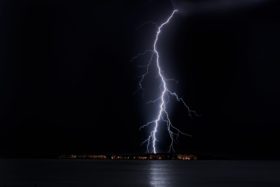Are Lightning Strikes Eligible for Worker’s Compensation?

A person being struck by a bolt of lightning is a rare event, whether it happens while out on the golf course, in your own backyard, or at work. According to the National Weather Service, the odds of a person being struck by lightning in a given year are about 1 in 1,220,000 and over the course of a person’s lifetime, the odds of being struck are 1 in 15,300. It’s been reported that the odds of getting a perfect score on your SATs are four times higher than your odds of being struck by lightning.
While lightning strikes are rare, they do happen. In all, approximately 250 people are injured by lightning each year and when those injuries do occur, 90% of them are not fatal. But even in nonfatal cases of being struck by lightning, the effects can be potentially disabling. The exact effects of being struck by lightning can vary depending on how intense the strike was and the type of strike involved, but can include:
- Burns
- Memory loss
- Ruptured eardrums
- Loss of vision
- Seizures
- Respiratory arrest
Lightning Strikes on the Job
Lightning strikes are something that can, in theory, happen to anybody. However, people who work in certain occupations can face a higher risk of being struck by lightning while on the job. Anyone who spends all or much of their time working outdoors is at risk for lightning strikes at work, particularly if they’re working outdoors in open areas, near tall objects (trees, scaffolding, silos, lifeguard towers, etc.), or near explosives or objects that could be conducive to lightning, such as metal structures. This includes lifeguards, roofers, utility workers, landscapers, lawn maintenance workers, agricultural workers, airport tarmac workers, and construction workers, to name a few.
Given this risk of lightning strikes, employers whose workers spend considerable amounts of time working outdoors are expected to take reasonable steps to help workers stay safe during a storm. OSHA provides lightning safety guidelines for employers, which include monitoring weather reports and rescheduling work when hazardous weather is expected, continuing to monitor weather reports throughout the day, and creating an emergency response plan to outline how workers are alerted to hazardous weather and how they should take shelter. Employee training is also recommended to help workers learn what procedures need to be followed in the event of a storm and how to spot signs of dangerous weather.
Worker’s Compensation & Lightning Strikes
If a person is injured on the job in any type of accident, making a worker’s compensation claim is generally going to be the way they get compensation for medical bills and lost wages. But does that include lightning strikes?
An important thing to understand about worker’s compensation is that it’s a no-fault system. This means that even if a worker isn’t injured as a direct result of employer negligence, they may still be eligible for workers compensation benefits. Even if the event that caused the injury was something that would be considered an act of God, like a lightning strike, a tornado, or other weather emergency.
However, as is the case for all worker’s compensation cases, there can be factors that impact whether or not you are eligible for benefits, so it’s important to contact a workplace injury lawyer as soon as possible for help with your case. For example, there may be worker’s compensation exemptions that apply to agricultural workers. Or if you were doing something outside the scope of your job at the time of the injury, you may not be eligible for benefits.
Contact a Michigan Worker’s Compensation Lawyer
Working with a lawyer on your worker’s compensation claim early in the process helps ensure that your claim is handled correctly and that you get all of the compensation you are entitled to. At Goodwin & Scieszka, we’re experienced in helping the victims of workplace accidents in the state of Michigan. Contact us today to find out how we can help.
Image: Pexels / Philippe Donn






